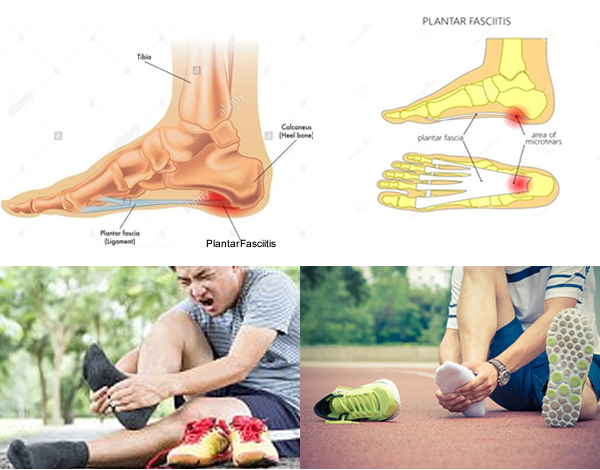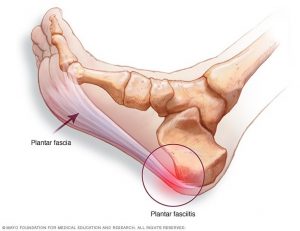Plantar Fasciitis is inflammation of the plantar fascia, a dense band of tissue that originates from the calcaneal (heel bone) tubercle and fans out to all five of the metatarsal heads. According to the American Academy of Orthopedic Surgeons, plantar fasciitis is the most common cause of heel pain. It functions like subflooring providing support to the foot and arch during weight-bearing and ambulation. Plantar fasciitis can be described as a sharp pain located in the heel that is exquisite upon first getting out of bed in the morning or initial weight-bearing and moving after prolonged sitting. Pain may subside after a period of moving around but intensify with prolonged activity. The more inflamed the fascia becomes, the pain will be long-lasting regardless of rest or activity.

Plantar fasciitis occurs when the fascia is repetitively stretched or elongated, causing inflammation and pain. Individuals with flat feet, high arches, tight calf muscles are at increased risk for getting plantar fascia. Plantar fasciitis is more common in runners and in people who are overweight. Individuals who wear shoes with inadequate support also have an increased risk of getting plantar fasciitis. Plantar fasciitis pain is usually worse after exercise, not during it. Ignoring plantar fasciitis may result in chronic heel pain that hinders your normal daily activities. Changing the way you walk to minimize plantar fasciitis pain can lead to foot, knee, hip, or back problems.

Factors Increasing Susceptibility of Plantar Fasciitis
www.mayoclinic.org/diseases-conditions/plantar-fasciitis/symptoms-causes
- Plantar fasciitis is most common between the ages of 40 and 60. Activities that place a lot of stress on the heel of the foot and attached plantar fascia tissue, such as long-distance running, ballistic jumping activities, ballet dancing, and aerobic dance, can contribute to an earlier onset of plantar fasciitis.
- Being flat-footed or having a high arch can create an abnormal walking pattern and alter normal foot mechanics. This can affect how weight is distributed when you're standing or moving, putting added stress on the plantar fascia.
- Excess body weight puts extra stress on your plantar fascia and other structures of the foot, ankle, knee, hip, and back.
- Occupations that require spending most work hours walking or standing on hard surfaces for long periods of time can damage the plantar fascia.
Certain foot types are also more prone to having plantar fasciitis. Sole Remedy can identify your foot type and risk factors and treat and prevent plantar fasciitis from reoccurring. Call today to make an appointment and get relief from plantar fasciitis pain!
Sole Remedy specializes in gait analysis, foot type assessment, musculoskeletal injury management, and fall prevention.
Phone: 508-295-8800 or 855-FOOT RX 9 to schedule an appointment today!
